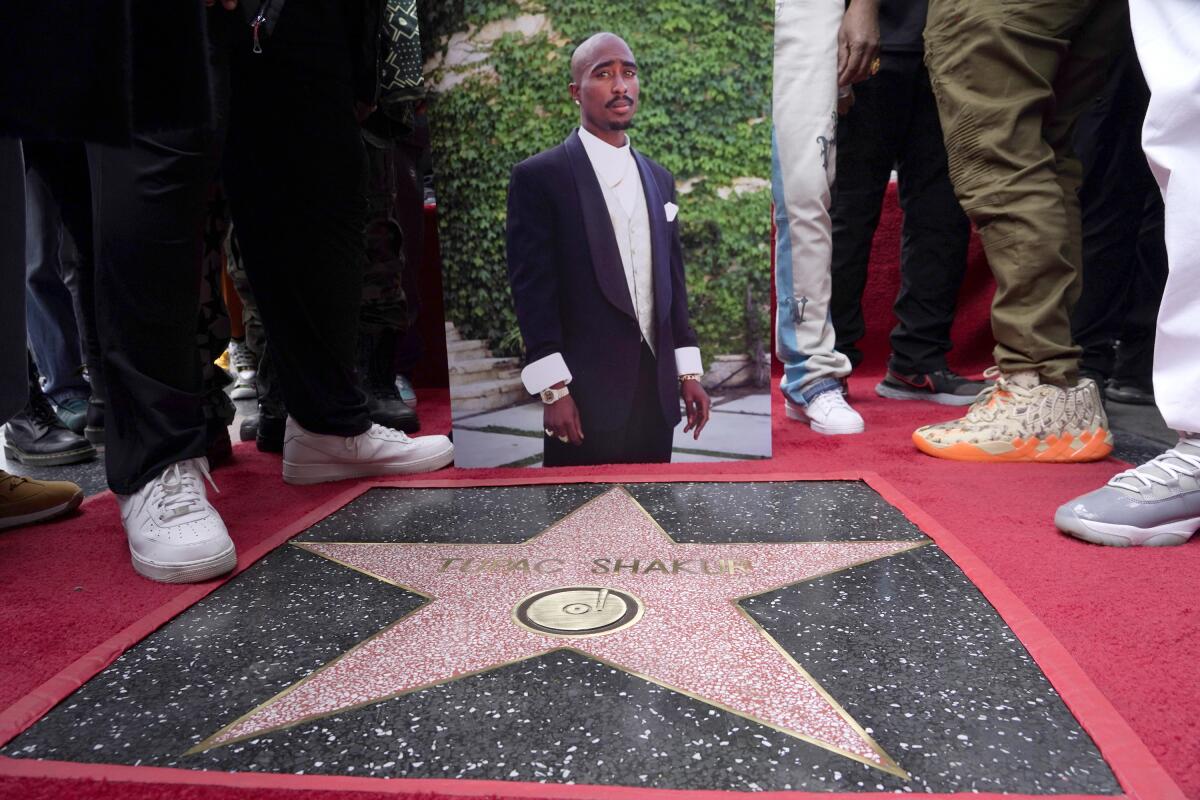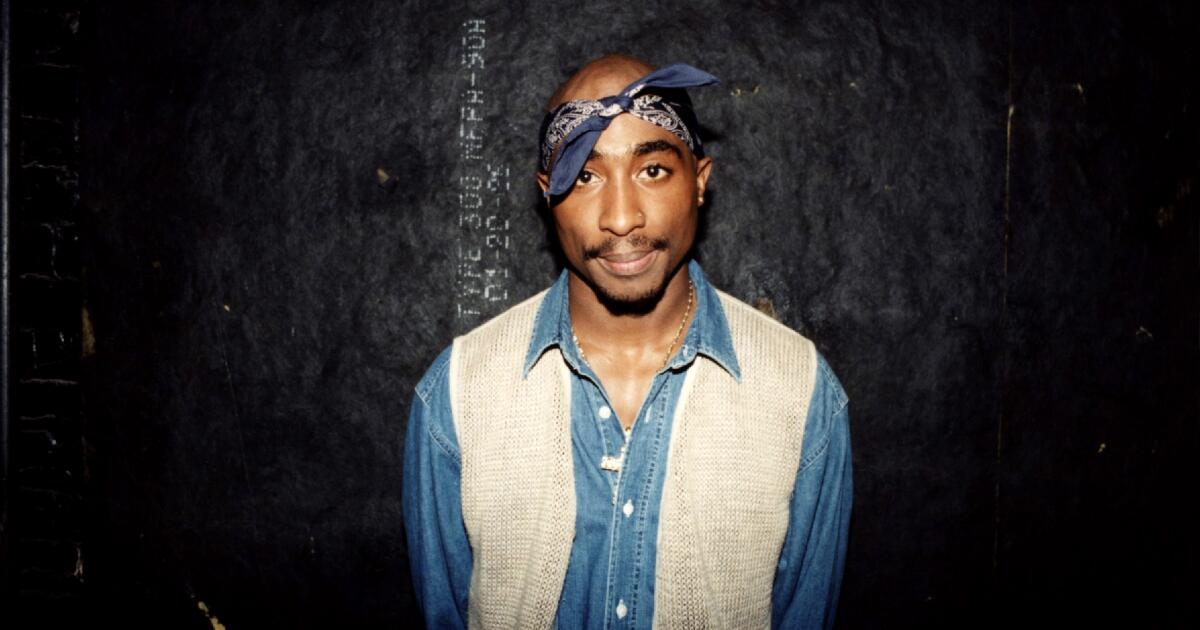It was an odd pitch. For nearly 30 years, veteran journalist and author Jeff Pearlman had made his bones as a respected sportswriter with a stacked resume that included seven New York Times bestsellers. His acclaimed 2014 read “Showtime: Magic, Kareem, Riley, and the Los Angeles Lakers Dynasty of the 1980s” was even adapted into an Emmy-nominated HBO series, “Winning Time: The Rise of the Lakers Dynasty.”
Yet when Pearlman told his agent in the summer of 2022 about an idea he had for a book chronicling the turbulent life, euphoric rise, and tragic death of hip-hop deity Tupac Shakur, he was met with bewilderment. “He said, ‘But you are a white guy who writes about sports,’” Pearlman said of the initial discussion.
“Only God Can Judge Me: The Many Lives of Tupac Shakur” (Mariner Books/HarperCollins Publishers), which hit bookshelves Wednesday, sticks out of Pearlman’s literary portfolio like Kendrick Lamar at a Drake fan meet-and-greet. His previous work detailed the highs, lows and triumphs of such sporting icons as the 1986 World Series-winning, wild bunch New York Mets; disgraced MLB pitcher Roger Clemons; dynastic ’90s Super Bowl champs the Dallas Cowboys; Chicago Bears running back great Walter Payton; NFL gunslinger Brett Favre; and two-sport phenom Bo Jackson.
Yet the charismatic Tupac Amaru Shakur, a gifted emcee, actor and social activist — who was killed at the too-soon age of 25 in a Las Vegas drive-by shooting on Sept. 7, 1996 — was as much an eloquent voice of a generation as he was the self-destructive face of gangster rap. The same celebrated Shakur who rapped about women’s empowerment on his hopeful song “Keep Ya Head Up,” also did a seven-month stint at Clinton Correctional Facility in upstate New York in 1995, after being charged and convicted of sexual abuse, stemming from a 1993 incident.
Shakur’s turbulent yet impactful short life was light years from Pearlman’s sleepy, rural Mahopac, N.Y., roots. “It’s admittedly weird that I’m the one writing a Tupac biography,” Pearlman says. “I tell people, ‘Look, I just want to acknowledge the obvious here. I’m not of hip-hop.’ But I found Tupac fascinating. I listened more to his second album “Strictly For My…” because I liked ‘I Get Around.’ [Beyond that], I’ve never written about hip-hop at any great length, but I don’t feel like the subject of Tupac had ever been done the way I wanted to do it.”
Tupac Shakur with Death Row Records boss Suge Knight.
(Jeff Kravitz / FilmMagic / Getty Images)
“Only God Can Judge Me” is a meticulous demystification of a young artist who since death has transcended into a global icon on par with Bob Marley.
Pearlman unearthed a young Tupac, a hopeless romantic during his years attending Baltimore School for the Arts from 1986-1988. There are the never-before-seen 150 love letters he wrote to then-girlfriend Mary, a ballet dancer, whose mom found them under a bed in Nebraska. “Tupac was writing Mary these poems about love, lust, longing and sadness,” Pearlman says. ”He was just 15. I can understand why women [flocked] to him.”
Pearlman interviewed the EMT worker who was first on the scene after Shakur was ambushed and shot in the lobby of Manhattan’s Quad Studios in 1994 (surprisingly enough, another first), a fateful event that would ignite the so-called East Coast versus West Coast rap war with friend-turned-rival Christopher “Notorious B.I.G.” Wallace. And yes, the urban legend is true. Tupac accidentally shot himself in the testicles.
Pearlman throws cold water on the myriad conspiracy theories that have haunted the memory of Shakur since his death. According to him, neither Notorious B.I.G. (the multiplatinum Brooklyn rapper who was also gunned down in 1997 in Los Angeles), Bad Boy label honcho Sean “Diddy” Combs, nor Death Row Records label boss Suge Knight, who signed Shakur to a recording deal after bailing him out of prison for $1.4 million, had anything to do with the murder, Pearlman said.
“Everyone has seen the [MGM Grand] video,” says Pearlman, referring to the night Shakur led a Death Row Blood-affiliated entourage in the filmed beating of Compton Crip Orlando Anderson. He allegedly retaliated later that night, killing Shakur as he was riding in the passenger seat of a black 1996 BMW. Prosecutors claim Anderson’s uncle, Duane “Keefe D” Davis, was the ringleader of the shooting. Davis is set to go to trial in February for his alleged part in the murder, potentially closing a chapter in one of true crime’s biggest mysteries.

Tupac Shakur received a star on the Hollywood Walk of Fame in 2023.
(Chris Pizzello / Invision / AP)
“I talked to James ‘Mob James,’ McDonald, who was a Death Row guy,” Pearlman says. “When I was interviewing him, I felt the pain coming off this guy. He was like, ‘Tupac’s murder was the dumbest s— ever.’ Tupac was a gifted talent who bought into the Blood image Suge sold him, and that’s why he is dead.”
Of course, the question has to be asked: Does the world need another Tupac book? There have been more than 40 works written about the Rock and Roll of Fame inductee, who has sold an estimated 125 million records worldwide and was on his way to becoming a respected thespian after a star-making debut in the gritty 1992 coming-of-age drama “Juice” as the psychopathic Bishop.
During the two and a half years Pearlman spent working on “Only God Can Judge Me,” the rapper’s estate released yet another posthumous book, 2024’s “Tupac Shakur: The Authorized Biography.” Pearlman, however, readily admits to taking a more obsessive approach to researching for his tome than his predecessors.
“There hasn’t been any other Tupac book where you interview 650 people, travel all over the country, and track everyone down,” he says. “That’s the book I wanted to write.”
There are indeed some head-turning finds in “Only God Can Judge Me,” the most noteworthy being the actual baby from Shakur’s early ’90s single “Brenda’s Got a Baby,” inspired by an April 21, 1991, New York Daily News piece about a 12-year-old Brooklyn girl who was raped by a cousin, hid her pregnancy from family members, and threw the infant down a garbage chute.
Pearlman had always loved the song. He was the only white kid in his 1990 Mahopac High class that listened to hip-hop. By chance he ran across a YouTube video of actor Omar Epps discussing the article that moved Tupac to write the track. Pearlman called genealogist Michele Soulli to see if she could track down the baby for the book. She hit the jackpot. Not only was the grown adopted child, Davonn Hodge, alive and well in Las Vegas, he was unaware of his direct connection to the classic record.
“Michele is amazing,” says Pearlman. “She also found Davonn’s mother, Jeanette, [who happened to be in town attending] a Red Hot Chili Peppers concert. They met later in Las Vegas. Thinking about it gives me chills.”

Central to the new book is Tupac Shakur’s relationship with his mother, Afeni Shakur, shown in 2003.
(Associated Press)
At the heart of “Only God Can Judge Me” is Tupac’s complicated relationship with mother Afeni Shakur. The former Black Panther leader, who died in 2016, battled drug addiction during the Shakur family’s years in Marin City, Calif. There’s a moment in the book before the aspiring emcee and Public Enemy fan joins Bay Area funk-rap group Digital Underground in 1990, where he is invited fly out to Atlanta to become the chairman of a civil rights youth group, the New Afrikan People’s Organization. But the $300 sent to Tupac to purchase a plane ticket came up missing. Afeni used the money to buy crack cocaine.
“I can see people reading this saying, why are you taking a s— all over Afeni Shakur?” Pearlman says. ”Who are you to do that?” But I view Afeni more heroically now than before I started this project. You see someone’s lows and the depths they rose from and how they overcame. Afeni lived an amazing life. People should be learning about her in history books.”
As for what he hopes fans and casual readers will take from “Only God Can Judge Me,” Pearlman waxes philosophical. “I hope people can appreciate the path that Tupac traveled and the trauma that he tried to overcome,” he says. “To me he is a tragic figure. He’s brilliant and gifted, but I feel like 54-year-old Tupac should be out here right now speaking out against the ICE raids. He should be here living life.”
This story originally appeared on LA Times

